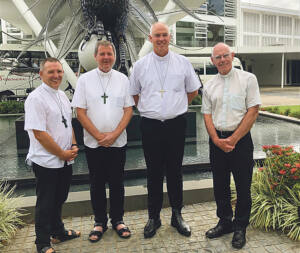
WelCom March 2023
Michael Fitzsimons
The Federation of Catholic Bishops Conferences of Oceania has spoken out on the need for ‘deeper ecological conversion’ and to embrace ‘the challenge of integral ecology’.
A statement, entitled ‘The oceans of the world are interwoven with the future hopes of all peoples,’ was prepared during the FCBCO’s assembly in Fiji in February.
In the statement, the bishops said: ‘The nations and peoples of the Oceania region are facing some of the world’s greatest uncertainties with growing anxiety, but with faith, hope and resilience.
‘Rising sea levels, extreme weather events, human and economic insecurity, compounded by exploitation and pollution threaten the survival of many communities. The decisions we make today will determine the region’s tomorrow, and how the vaka (canoe) of our peoples is held by the oceans.’
Bishop Anthony Randazzo, the newly elected president of the FCBCO said: ‘The unique face of Oceania has called us together for deeper ecological conversion and to respond from the heart. Embracing the teaching of Laudato si’ and the challenge of integral ecology, we recognise that our economic systems need to be in balance with the pulse of life.
‘We are hearing the cry of the land and water, we are hearing the cry of the poor, we are hearing the cry of the ocean. We are also hearing the Holy Spirit present in all these moments. As disciples of Christ, we commit ourselves to His mission to bring life to all, reconciliation and healing of all the many relationships of which we are part – with God, with our fellow human beings, with sea, earth and sky,’ Bishop Randazzo said.
The assembly, which is held every four years, brought together dozens of members of the bishops’ conferences of Australia, New Zealand, Papua New Guinea/Solomon Islands and the Pacific Islands.
Wellington’s Monsignor Gerry Burns was a participant observer at the assembly. He said there were three main points of business for the assembly: the role of the Church communities in the care of the earth, especially the oceans; the Oceania response to the continental stage synod document; and how the FCBCO can further develop its good functioning.
‘Bringing life to this process was participation in vibrant, enculturated liturgies, visits to sites of ecological damage (gravel mining and coastal erosion), scientific and theological input, times of prayerful listening to the Spirit, animated meal-time conversations,’ he said.
‘As a participant observer it was a privilege to observe the bishops thinking about, debating and wrestling with various parts of the business at hand, relaxing, praying together and celebrating the Sacrament of Reconciliation keeping in mind the healing and reconciliation needed with others, creation and God.’
Dunedin’s Bishop Michael Dooley was adamant that action from the Church and its leaders on climate issues was necessary.
‘I think, as a Church, we need to speak on behalf of those people, the vulnerable people who often don’t have an opportunity to have their voices heard.’
Auckland’s Bishop Steve Lowe echoed this view when he celebrated Mass on Wednesday. In his homily he asked the bishops to advocate for the poor, and the earth, to be ‘a breath of life’.
From their meeting in Suva the Catholic bishops of Oceania sent a message of prayerful condolence and solidarity to Church and civic leaders in Turkey and Syria as the countries suffer the effects of devastating earthquakes.